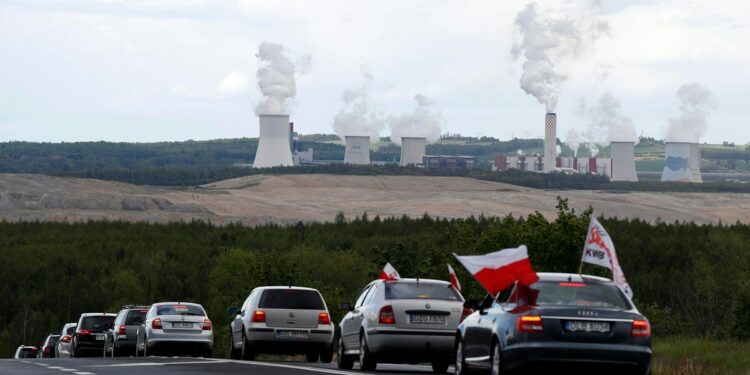By Anna Mikulska & Eryk Kosinski
In a recent policy brief, we have considered an unprecedented conflict that is brewing between Poland and Czechia. At stake is the future of one of Poland’s largest lignite mine, located in the city of Turów. According to the Czechs, who have filed a complaint with the Court of Justice of the European Union (CJEU), the open-pit mine violates European Union’s (EU) environmental laws. In essence, the conflict has a local flavor but several aspects underscore its regional (EU-based) and global implications. The details of the dispute illuminate major hurdles that countries around the globe will face in eliminating coal from their energy mix—and the need to develop local solutions to set an ambitious and actionable path toward decarbonization.
The Dispute and Issues at Stake
On February 26, 2021, the Czech Republic filed a lawsuit against the Republic of Poland with the CJEU. It accused Poland of violating EU law when expanding one of its largest lignite mines. The lawsuit also called for suspending the Turów mine’s operations until the final ruling, a temporary (at least for now) but draconian measure that the CJEU approved on May 20, 2021. Poland ignored the injunction and requested a less restrictive legal remedy. It also initiated a dialogue with the Czech Republic in hopes that the latter withdraws the lawsuit. But subsequent negotiations have not been successful. In September 2021, the CJEU has imposed a fine of 500,000 euro a day for noncompliance with the temporary order to halt mine’s operations.
The dispute over the mine is not new. Since at least 2015, Poland and the Czech Republic have engaged in intergovernmental talks on the cross-border impact of the Turów mine and an extension of its operating license, with little to no effect. Recent escalation of the conflict is the most serious yet as Czechs complain that a cross-border environmental impact assessment was not conducted before an extension of the mine’s production license. They also argue that the mine’s activities negatively affect groundwater levels on their side of the border.
To justify the mine’s operations, Poland has used arguments related to energy security and the economic welfare of the local community. After all, the Turów mine supplies the nearby power plant, which with total installed capacity of 1.5 GW, meets 5% Poland’s total energy production and provides electricity to approximately 2.3 million households. It is also the only supplier of heating and domestic hot water for almost all of the Bogatynia region (population of about 18,000). The mine and power plant are also critical employers in the region, with almost 2,400 and 1,200 employees, respectively. If indirect employment with cooperating entities and employees’ families are added to the above, the complex becomes a source of a stable income for anywhere between 60,000 and 80,000 people.
In contrast, noncompliance with the CJEU’s ruling – while it resulted in very significant fines – is diffused spatially, across all of Poland, and spread across the entire Polish economy rather than focused on only one – critical – sector. The impact is also not immediate as it will take time for the fines to trickle down and affect the country’s economy and people’s wellbeing.
Implications
The Turów mine dispute underscores a more general concern about the ability of international institutions (or agreements) to enforce transnational laws, even when they have relatively strong institutional foundations, like that of the EU. Such enforcement is particularly difficult when international commitments collide with domestic interests and when diffused, general and long-term goals (such as those of climate action) are set against the specific and immediate interests of a local community or a nation. Local, highly-emitting energy sources such as lignite, are particularly difficult to phase out, as their extraction and use often underlie the existence of entire local communities.
To be successful, climate measures must pay more attention to and, whenever possible, address national and local concerns. This requires a more detailed assessment of each country’s social, economic, and political environment, and tailoring commitments to suit a given country’s needs and limitations. Admittedly, the process is more burdensome, slower, and is likely to bring less expansive results. But there is no one-size-fits-all solution to decarbonization and climate policy. Hence, a more tailored approach can actually result in a much more comprehensive treatment of climate matters, with new and diverse solutions that exploit countries’ comparative advantage. The results may take a while and be incremental, but could ensure an actionable path forward.
The realization is important as politicians gather in Glasgow for the next iteration of climate talks. Coal is likely to become one of the most contentious issues in this discussion; particularly as coal consumption has risen around the globe on the back of post-COVID19 recovery and insufficient supply and high prices of natural gas giving rise to concerns about two important elements of security of supply: accessibility and affordability.
Anna Mikulska is a nonresident fellow for the Center for Energy Studies at Rice University’s Baker Institute for Public Policy & senior fellow at the Foreign Policy Research Institute.
Eryk Kosinski is Professor of Law and Administration at the Adam Mickiewicz University, Poznan, Poland and a Visiting Professor at the Ivan Kozhedub Kharkiv National Air Force University, Kharkiv, Ukraine.











